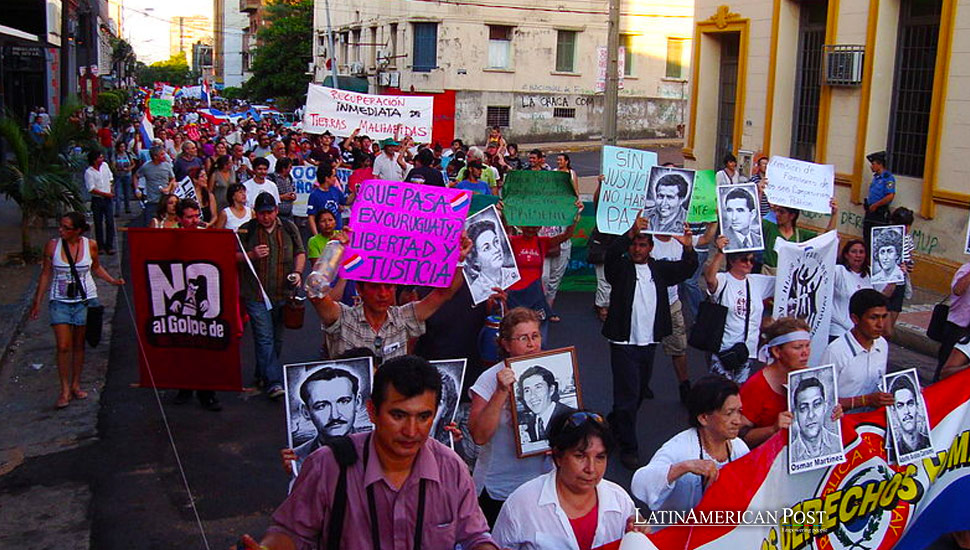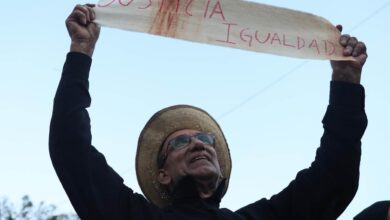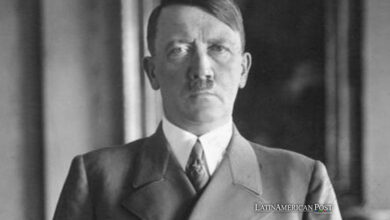Paraguayan Campesinos Continue Fight for Land Legalization Twelve Years After Curuguaty Massacre

As twelve years have passed since the Curuguaty massacre in southeastern Paraguay, where eleven farmers and six police officers lost their lives during a land eviction conflict, Paraguayan campesinos persist in their demand for land legalization.
On the site of Marina Kue in the Canindeyú department, where the massacre occurred in 2012, a religious ceremony was held this Saturday, presided over by Apostolic Nuncio Vincenzo Turturro. Family members of the deceased campesinos attended, demanding justice for the massacre and the titling of the disputed 1,748 hectares.
Darío Acosta, leader of the ‘Association of Families of Victims of the Curuguaty Massacre,’ spoke to EFE, highlighting that despite years passing, the land regularization of Marina Kue remains unresolved. Acosta noted that the Apostolic Nuncio showed “goodwill to accompany” this process and intercede with the Paraguayan government.
“This celebration of twelve years is not only about the interest in land regularization but much more. It is about respecting the rights and dignity of campesinos fighting for their land. Death, never again,” affirmed Acosta.
The Curuguaty massacre occurred on June 15, 2012, when the police launched an operation to evict a group of about 70 campesinos occupying lands forcibly. They demanded to be included in agrarian reform. This tragic event quickly escalated into a significant political crisis, leading to the ousting of then-leftist President Fernando Lugo, who had come to power in 2008, ending 61 years of Colorado Party dominance.
Political Turmoil and Legal Battles
In a swift political impeachment, Lugo was removed from office for poor performance of duties in June 2012, and Vice President Federico Franco completed his term. Following the massacre, eleven campesinos were convicted, while no police officers were held accountable. However, in July 2018, the Supreme Court of Justice annulled the sentences and freed those serving between four and thirty years in prison.
The human rights organization Coordinadora de Derechos Humanos del Paraguay (Codehupy) issued a statement this Saturday, asserting that “the state has not yet secured the lands nor conducted a thorough investigation into the deaths of the campesinos,” nor has it punished those responsible. Codehupy also demanded that local institutions effectively implement measures to compensate the victims’ families.
Meanwhile, Paraguay’s National Police commemorated the six deceased officers with a posthumous tribute in the eastern department of Alto Paraná, where they were remembered as “heroic martyrs.”
Remembrance and Continued Struggle
The backdrop of this ongoing struggle for land rights in Paraguay is steeped in a broader Latin American context, where land conflicts have historically been a focal point of social and political tensions. Land distribution has been a contentious issue in many Latin American countries due to historical inequities and the legacy of colonial land tenure systems.
Paraguay’s agrarian conflict mirrors similar struggles across the region. For instance, Brazil has seen numerous violent confrontations between landless workers and large landowners, leading to significant social movements advocating for land reform. Likewise, in Colombia, land rights have been at the heart of the country’s internal conflict, with displaced farmers demanding restitution and protecting their rights.
The roots of Paraguay’s rural issues can be traced back to the country’s history of land distribution policies, which have often favored the elite. President Lugo’s agrarian reform aimed to address these disparities, but his abrupt removal from office stalled progress. This interrupted reform and unfulfilled promises pattern is a common theme in Latin American agricultural history.
The Fight for Land and Dignity
The Curuguaty massacre and the subsequent political upheaval highlight the fragile nature of social progress in the face of entrenched interests. The campesinos’ fight for land regularization is not merely a local issue but part of a broader struggle for justice and equity in Latin America. The persistence of the campesinos and their supporters underscores the deep-seated demand for systemic change in the region.
As the community commemorates the twelfth anniversary of the Curuguaty massacre, their call for justice and land rights remains as urgent as ever. The presence of the Apostolic Nuncio at the ceremony symbolizes a potential for renewed dialogue and advocacy at higher levels. However, the path to achieving these goals is fraught with challenges as historical grievances, and contemporary political dynamics continue to shape the landscape of agrarian reform in Paraguay and beyond.
The commemoration of the Curuguaty massacre serves as a poignant reminder of the ongoing struggles for land rights and justice in Paraguay. It also reflects the broader Latin American context, where campesinos continue fighting for their rights and dignity against historical inequities and political challenges. The quest for land regularization in Marina Kue is not just about securing hectares of land but about honoring the memory of those who died and ensuring that such tragedies never happen again. The legacy of the Curuguaty massacre is a call to action for all those committed to justice and human rights in Latin America.





